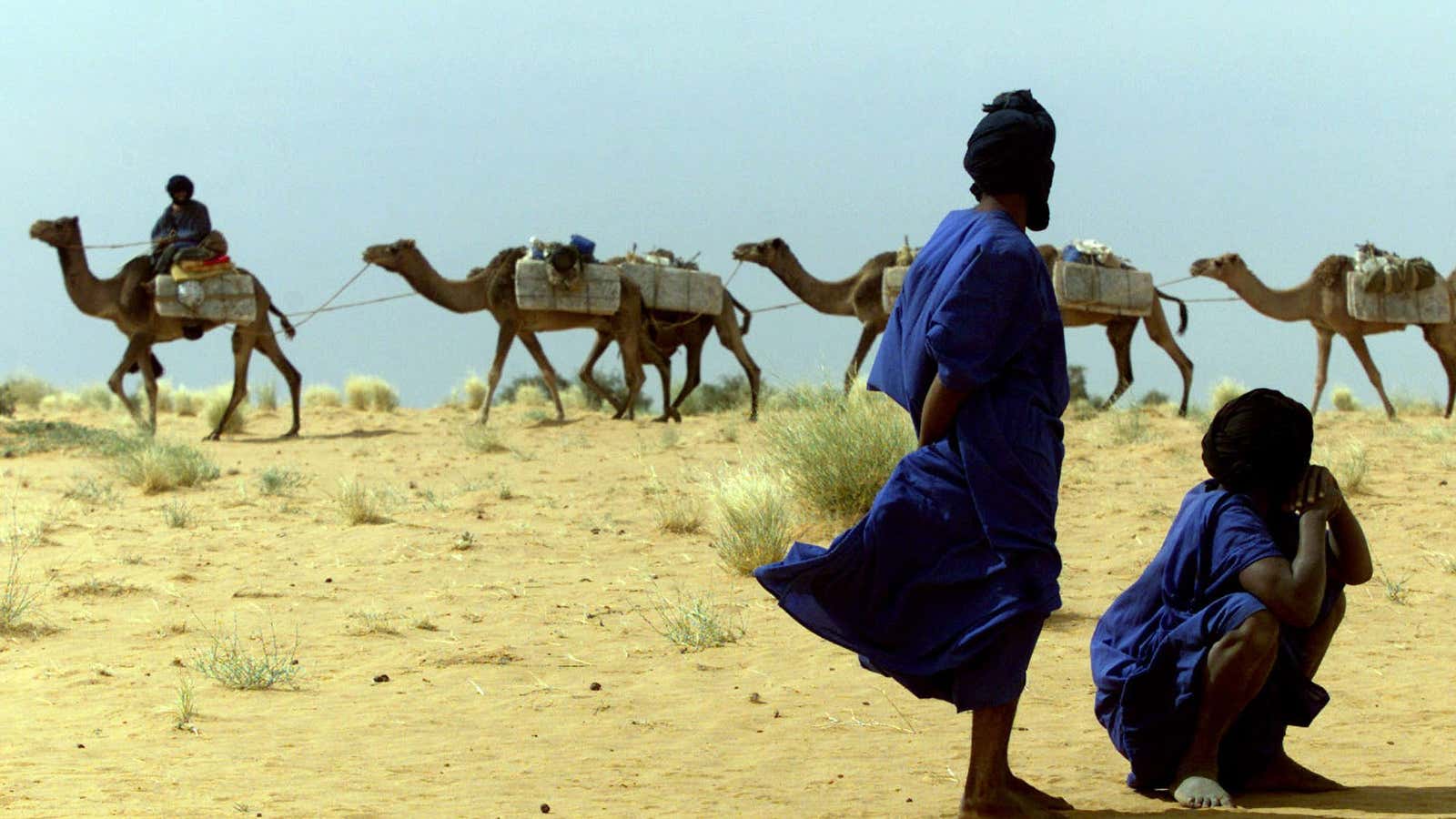The dream of the founding fathers of the Economic Community of West African States (ECOWAS) was, among others, to foster trade and development among member states. But the integration dream will only be realized if institutional barriers to trade are addressed. These include poor protection of trade routes, weak enforcement, the fact that traders don’t know their rights and how to make complaints, and the lack of a common currency in the region.
The union has relied on agreements and announcements to meet its integration goals. But they aren’t enough. ECOWAS needs to operate beyond the office and paper agreements. It needs to establish physical operations at border points.
Leaders have lessons to learn from history – both ancient and recent. Our latest study shows that policymakers concerned with deepening integration in ECOWAS should look back in time to regional trade institutions in West Africa.
Empires laid the foundation for integration
Western Sudan experienced three major empires—Ghana, Mali and Songhai—from around 790 to 1650 AD. These empires covered most of present day West Africa and, to some extent, defined the precolonial history of the region. They laid the foundations for standards governing regional trade. For example, the Mali Empire—which succeeded and absorbed the Ghana Empire—adopted the import and export taxes it found. The Mali and Songhai empires – through consensus, trust and cooperation – subsumed more than 24 lesser kings under their authority.
The expansion of empires by absorbing other empires gradually led to common trade taxes and institutions. The Mande charter of 1236 was particularly important. The charter is one of the oldest constitutions in the world although in oral form. It brought clans and small kingdoms together and codified how they were governed. Its provisions entrenched tolerance and social peace among diverse groups through the building of trust and cooperation. Citizens of different clans and kingdoms agreed to live under one king in order to maintain peace, protect trade routes and harmonize trade rules.
In those ancient times, intra-West African trade was extensive with cowrie shells, gold, copper, manillas and cloth acting as common currencies and facilitating trade in the region.
But the last major empire in West Africa—Songhai—collapsed around 1650, creating a power vacuum that resulted in internal conflicts. This gave rise to inward-looking kingdoms, and marked another turning point in the development of trade institutions in West Africa.
Slave trade, colonialism and regional institutions
The conventional argument is that the Atlantic slave trade (1500 and 1900) and subsequent colonization (1885 – late 1960s) interrupted the natural development of institutions in the region. But it’s important to note that institutions such as common currencies, single administration, contract enforcement through chiefs and a common education system were put in place. These institutions continue to be important in promoting regional trade.
Colonialism led to a production structure that served international rather than regional trade. Europeans were interested in trade flows between Europe and West Africa, where West Africa provided the raw materials for manufactured goods.
Despite the potential practical benefits, enthusiasm to preserve the institutions of the colonial powers gradually waned, particularly in the British colonies. Apart from the West African Examination Council – which designed a uniform curriculum and examination materials for all the British West African colonies – other institutions in the former British colonies were abandoned after independence. Things were somewhat different in the French colonies where the single currency and some of the other institutions of colonial times were maintained.
During colonial times, contracts were enforced and disputes settled in ways similar to the empirehood period. Chiefs in the colonial era communicated the value of the colonial currency to the locals and taught them how to avoid exploitation. These chiefs were synonymous to the representatives in provinces during the empirehood.
But the protection of trade routes was more standardized and better enforced during the empirehood than it was in the colonial period. For example, during the colonial period, the influence of European traders gradually replaced that of the chiefs, and consequently led to bandits and robbers attacking trade routes.
Just as the royal armies patrolled trade routes and royal officials in the provinces monitored arrangements during the empirehood, ECOWAS needs to deploy personnel to patrol trade routes as well as place staff at border points to monitor how trade takes place.
Deep integration
The empirehood and colonial eras offer a practical case study for West Africa to have the confidence that deep integration is feasible.
Over the longer term, a federal style administration could be a sustainable approach to deeper integration. For example, West Africa could be clustered into zones where each zone has an elected head of state on a rotational basis. But it would require strong political will to give up national sovereignty. This can only be considered if it can be demonstrated that the benefits would be greater than under current arrangements.
Some progress has been made. A common external tariff for the region came into force in 2015. And more economic integration is happening with the establishment of the West African Economic and Monetary Union and the West African Monetary Zone.
In the shorter term, we also suggest that regional trade institutions such as a common currency, enforcement of contracts and protection of trade routes become more standardis=zed. In addition, ECOWAS needs to use the media to tell people about their rights. It must also be ready to punish those who harass traders, and to give incentives to its officers to reduce the motivation to take bribes.
These steps worked in the empirehood era. They worked in the colonial era. They will work today to foster trade among member states and integrate the West African region.
Karen Jackson, Senior Lecturer in Economics, University of Westminster; David Potts, Senior Lecturer (Development Economics/Project Appraisal), University of Bradford, and Essa Bah, Teaching Assistant in Economics, University of Leeds
This article was originally published on The Conversation. Read the original article.
